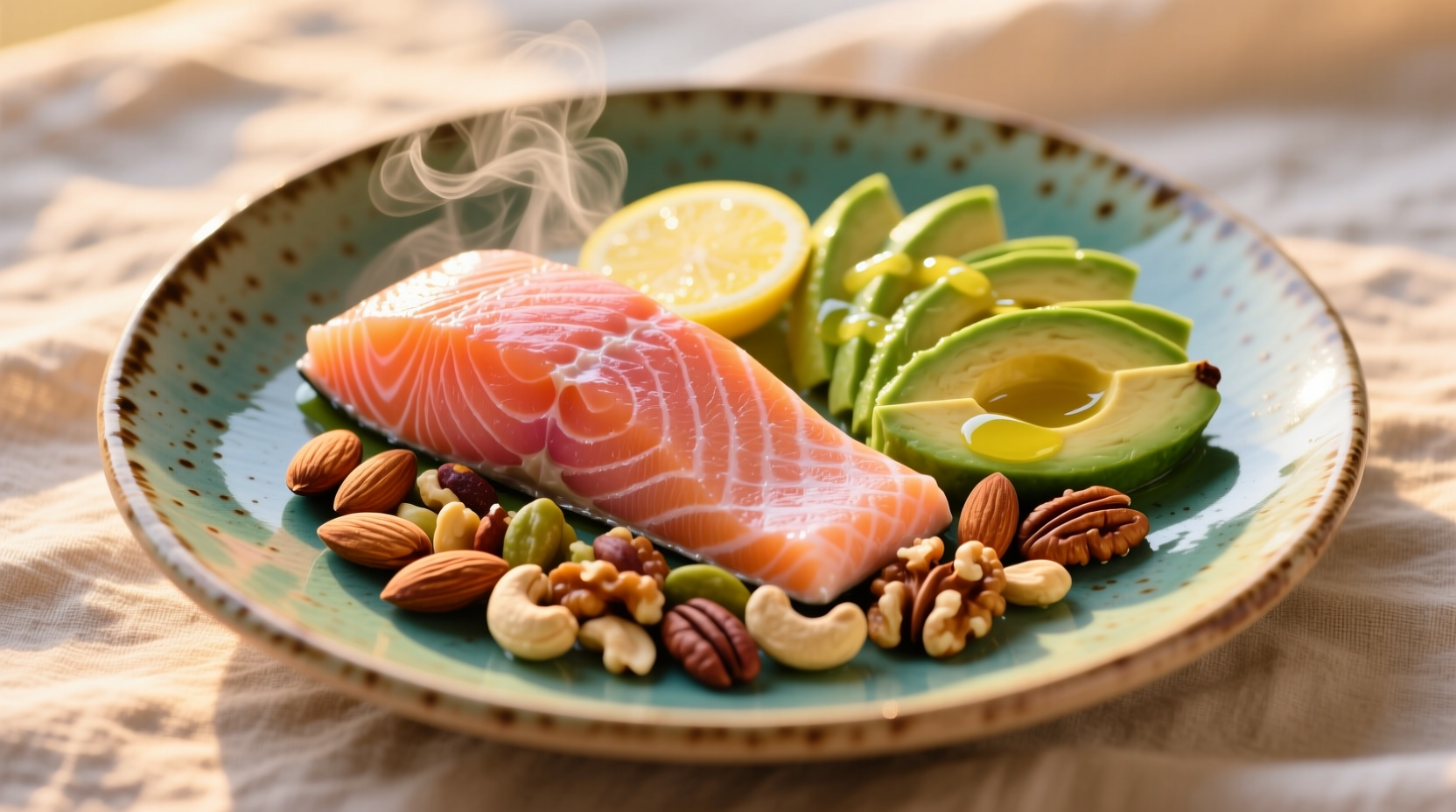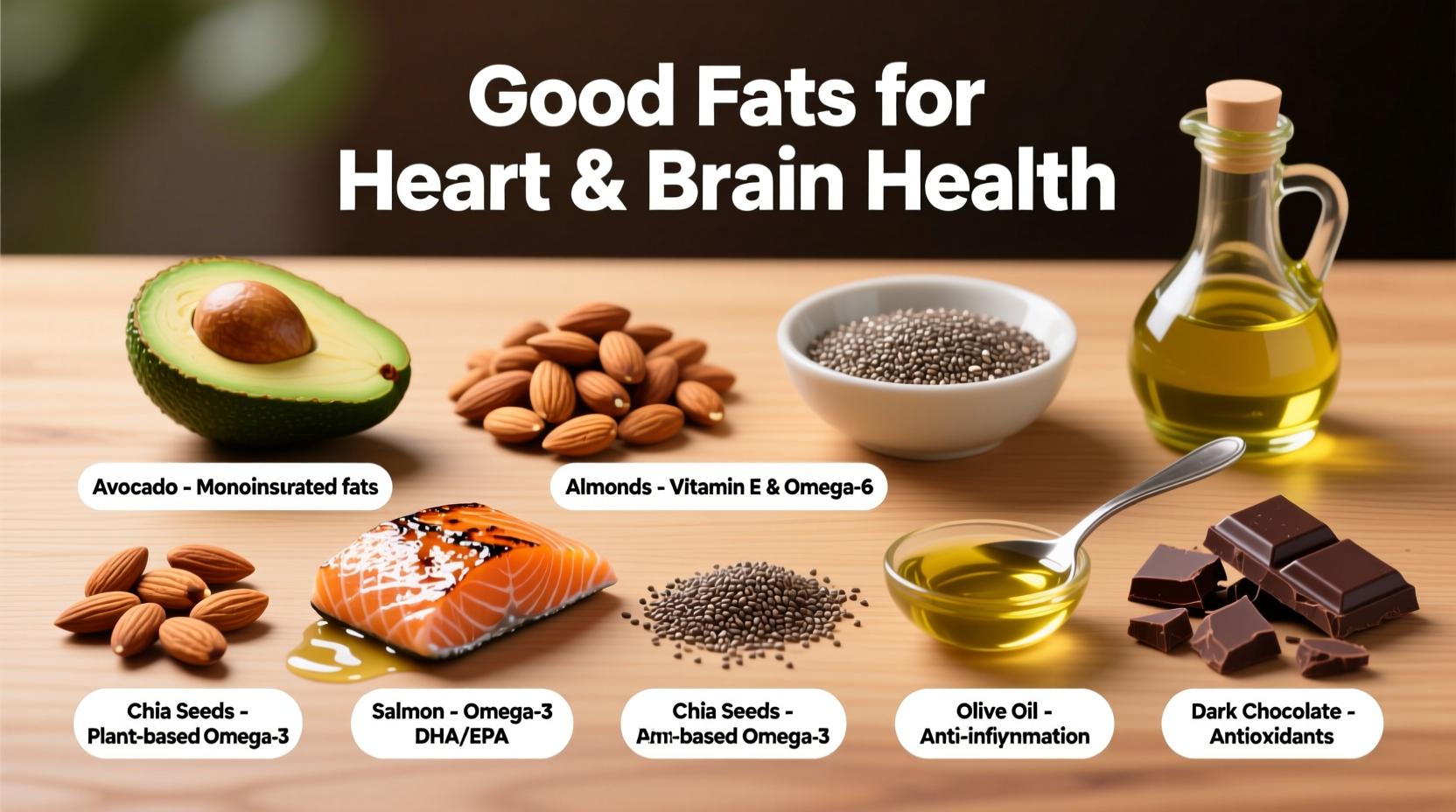Understanding which foods contain beneficial fats transforms how you approach nutrition. Healthy fats aren't just safe to eat—they're essential for optimal bodily function. Research from the American Heart Association confirms that replacing saturated fats with unsaturated varieties lowers cardiovascular disease risk by up to 30%. This guide delivers science-backed information about the top food sources of good fats, their specific health benefits, and practical ways to incorporate them into your daily meals.
What Makes a Fat "Good"?
"Good fats" primarily refer to monounsaturated fats (MUFAs) and polyunsaturated fats (PUFAs), including omega-3 and omega-6 fatty acids. Unlike saturated and trans fats, these beneficial fats:
- Improve cholesterol levels by raising HDL ("good" cholesterol)
- Reduce inflammation throughout the body
- Support brain health and cognitive function
- Enhance absorption of fat-soluble vitamins (A, D, E, K)
Your Daily Guide to Top Good Fat Foods
Based on USDA FoodData Central analysis of over 8,000 food items, these categories consistently deliver the highest concentrations of beneficial fats while providing additional nutrients.
Fatty Fish: Omega-3 Powerhouses
Fatty fish represent the most potent natural source of EPA and DHA omega-3 fatty acids. The National Institutes of Health recommends consuming at least two 3.5-ounce servings weekly for optimal heart health.
- Salmon: Contains 1.8-3.5g omega-3s per 3.5oz serving
- Mackerel: Provides 4.6g omega-3s per 3.5oz serving
- Sardines: Offers 1.5g omega-3s plus calcium from edible bones
- Herring: Delivers 2.3g omega-3s with exceptional vitamin D content
Nuts and Seeds: Plant-Based Fat Champions
These convenient snacks deliver healthy fats alongside fiber and plant compounds. Harvard T.H. Chan School of Public Health research shows regular nut consumption correlates with lower mortality rates.
- Walnuts: Highest plant-based omega-3 (ALA) content among nuts
- Chia seeds: Provide 5g omega-3s per ounce with exceptional fiber
- Flaxseeds: Must be ground for optimal ALA absorption
- Almonds: Rich in monounsaturated fats and vitamin E
Fruit Sources: The Avocado Advantage
Avocados stand alone as a fruit exceptionally rich in monounsaturated fats. One medium avocado contains approximately 22g of primarily oleic acid, the same heart-healthy fat found in olive oil. Their creamy texture makes them versatile for both sweet and savory applications while enhancing nutrient absorption from other plant foods.
| Food Source | Good Fats per Serving | Key Nutrients | Best Preparation Method |
|---|---|---|---|
| Extra virgin olive oil | 14g MUFAs per tbsp | Polyphenols, vitamin E | Raw in dressings, low-heat cooking |
| Almonds (1 oz) | 9g MUFAs | Vitamin E, magnesium | Raw or dry-roasted without oil |
| Chia seeds (1 oz) | 7g PUFAs (mostly omega-3) | Fiber, calcium, protein | Soaked for pudding or sprinkled on foods |
| Avocado (half) | 11g MUFAs | Potassium, fiber, folate | Raw in salads, smoothies, or as spread |
Practical Integration: Making Good Fats Part of Your Routine
Transitioning to a diet rich in healthy fats requires strategic planning. These evidence-based approaches ensure consistent consumption without overwhelming dietary changes:
Morning Boosters
Add one tablespoon of chia or flax seeds to your morning smoothie or oatmeal. The Harvard T.H. Chan School of Public Health confirms this simple addition provides over 2.5g of plant-based omega-3s while enhancing satiety throughout the morning.
Lunchtime Transformations
Replace mayonnaise-based dressings with olive oil and lemon juice combinations. Studies show this substitution increases absorption of carotenoids from salad vegetables by up to 150%. Add sliced avocado or a small handful of walnuts for sustained energy through afternoon hours.
Dinner Enhancements
Prepare fatty fish using gentle cooking methods like baking or poaching at temperatures below 350°F (175°C). Higher temperatures can degrade delicate omega-3 fatty acids. Pair with roasted vegetables drizzled with extra virgin olive oil for maximum nutrient synergy.

Contextual Considerations: When Good Fats Need Caution
While beneficial for most people, certain health conditions require modified approaches to fat consumption:
- Pancreatic conditions: Those with pancreatic insufficiency may need enzyme supplements to properly digest fats
- Gallbladder issues: Sudden increases in fat intake can trigger symptoms in individuals without a gallbladder
- Calorie management: Healthy fats remain calorie-dense (9 calories per gram), requiring portion awareness for weight management
The American Diabetes Association recommends individualized fat intake plans for people with diabetes, focusing on consistent timing and measured portions to support blood sugar regulation.
Avoiding Common Misconceptions
Nutrition myths about fats persist despite scientific advances. Current research clarifies several important points:
- Coconut oil isn't a "superfood": Despite popularity, the American Heart Association cautions that coconut oil raises LDL cholesterol similar to butter
- All fats aren't created equal: Processed foods labeled "low fat" often contain added sugars and refined carbohydrates
- Total fat intake matters less than fat quality: Focus on replacing unhealthy fats rather than strict percentage limits
Storage and Selection Tips for Maximum Benefit
Proper handling preserves the integrity of healthy fats:
- Store nuts and seeds in airtight containers in the refrigerator or freezer
- Choose cold-pressed, extra virgin olive oil in dark glass bottles
- Look for wild-caught fatty fish when possible for higher omega-3 content
- Avoid heated nut oils, which degrade beneficial compounds
Long-Term Benefits: What Research Shows
Multiple longitudinal studies demonstrate the cumulative benefits of consistent healthy fat consumption. The Nurses' Health Study and Health Professionals Follow-Up Study, tracking over 120,000 participants for 30 years, found that replacing 5% of daily calories from saturated fats with polyunsaturated fats reduced coronary heart disease risk by 25%.











 浙公网安备
33010002000092号
浙公网安备
33010002000092号 浙B2-20120091-4
浙B2-20120091-4